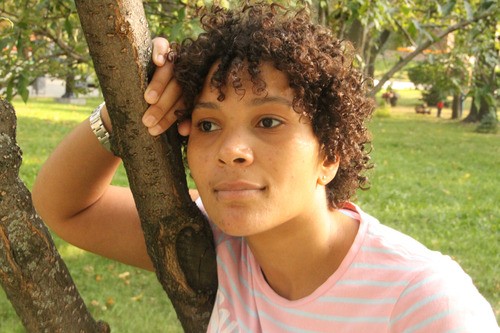She comes across as a shy girl, but her profession demands forwardness. As a journalist in Kyiv, Antonina Gensyor, 27, covers everything from politics to culture. But her favorite topic is music. Rock music to be exact.
She was born and raised in Odessa, a major port city in eastern Ukraine. Antonina moved to Kyiv in 2000 to enroll in the Taras Shevchenko Journalism Institute. Her father is from Burkina Faso and her mother is Ukrainian. Document and other issues forced him out of the country when she was a young child, so she doesn’t remember much about him. But Antonina still talks to him once a month or so, though she says his remote location in Burkina Faso makes their communication challenging.
For Antonina, being a black Ukrainian isn’t so hard. But, sometimes, people don’t think she’s Ukrainian at all.

When she was a university student, Antonina says people always assumed she was a foreigner. She often found herself explaining her parentage to her classmates. There were many foreigners enrolled in her journalism institute, so she understood their reasoning, she says.

Her days in elementary school days, however, weren’t so comfortable at times. “I was the only mulatto in school for a while,” she told me. “The other kids would call me “Negrochanka” or “Chunga Changa.” I asked her whether she felt the kids were trying to insult her. She said it depended on the context. But generally, she was never comfortable with the terms, harmless intent or not.
Interesting Note: This link below goes to a very famous cartoon called “Chunga Changa.” its a Soviet Era cartoon which was targeted to Soviet children, telling of the “exotic lands” of Africa. The kids who called Antonina “Chunga, Changa” were referring to this song. There is not English translation, but all of the Russian speakers can join in to help out.
http://www.youtube.com/watch?v=KWGovsuRWYM&p=FCC65F03540F700C&index=2&playnext=2

Antonina has an older brother, also a black Ukrainian, who lives in Odessa with his Ukrainian wife and their child. So she’s in the big city all by herself, she says with a smile.

Antonina feels optimistic about the future of mulattos in Ukraine. Eventually, her country of birth will be a place where people with her skin tone will lead promising futures and color is less of an issue than it is now. Let’s hope, not only that Antonina’s correct, but that such a time comes sooner rather than later.
You can read Terrell J. Starr’s blog here.
